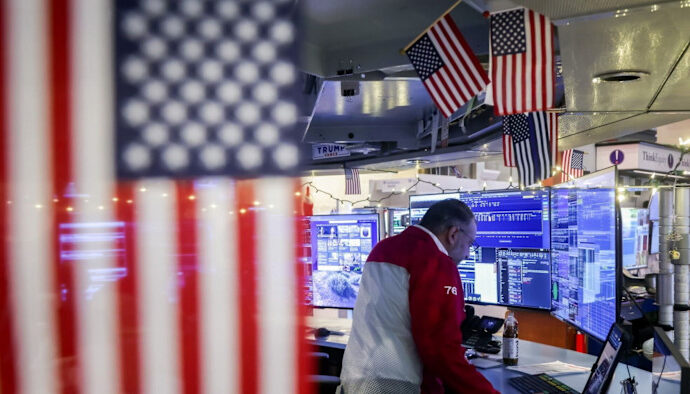
Stay informed with free updates
Simply sign up to the Global Economy myFT Digest — delivered directly to your inbox.
China is due to release July trade data on Thursday, with economists expecting its exports to rise by 5 per cent year on year, delivering a bumper monthly trade surplus of $103.4bn.
The country’s ballooning surpluses are set to continue. Goldman Sachs expects the country to achieve an annual trade surplus equal to 4.9 per cent of GDP this year, up from 4.1 per cent in 2024.
The strength of exports comes despite the fact that China’s shipments to the US have sharply declined under the weight of President Donald Trump’s 30 per cent tariffs.
Customs data showed a 10.9 per cent fall in exports to the US in June, even as China recorded a trade surplus that month of $114.8bn. The numbers highlight the extent to which nimble global supply chains have allowed Chinese businesses to reroute trade.
Factory gate prices have been contracting since October 2022, making Chinese manufactured goods extremely competitive. Many are also of world-class quality, in industries ranging from batteries to electric vehicles and solar panels.
But there are signs that the pace of export growth could soon start to slow. Last week, separate purchasing managers’ indices for the manufacturing sector prepared by China’s statistics office and the Caixin media group both missed expectations, as a fall in export orders and weak domestic demand took their toll.
Analysts at BofA Global Research said that the weakening of new export orders “could be an early sign that momentum is beginning to fade”. Looking ahead, they warned, “the risk is skewed to the downside in the absence of additional policy stimulus”. William Sandlund
What signals can we expect from Bank of England rate setters?
Swaps markets suggest a more than 85 per cent probability of a quarter point interest rate cut from the Bank of England on Thursday, taking the bank’s policy rate to 4 per cent. Deepening divisions on the BoE’s Monetary Policy Committee make it much less likely that the central bank will give a clear steer on how it expects policy to evolve further ahead.
With doves on the committee worrying about a weakening jobs market, and hawks focused on a continued overshoot in headline inflation, the MPC is likely to stick to its current guidance of a “gradual and careful” approach to cutting rates, while keeping its options open for decisions at future meetings.
Economists said last month’s unexpected uptick in UK inflation would make it difficult for the BoE to justify a faster pace of cuts than markets are already expecting — on top of Thursday’s expected cut, swaps markets suggest another two quarter point cuts will take the benchmark rate to 3.5 per cent by April’s meeting.
But Michael Saunders, a former MPC member now at the consultancy Oxford Economics, said developments since the BoE last published economic forecasts in May were unlikely to swing the balance of opinion on the committee in a more hawkish direction:
“Monetary policy remains quite tight. Fiscal policy is tightening, and the Budget may include further tax hikes this year. Trade policy uncertainty remains high, deterring investment and hiring. The resultant disinflationary effects for the UK may be reinforced by trade diversion from China.” Delphine Strauss
Can US stocks keep rising?
Weaker than expected US jobs data knocked the stuffing out of the dollar, but also added to negative pressure on stocks, on top of the latest tariffs announcements from Donald Trump.
Friday’s news came after a string of second-quarter earnings releases had propelled US tech stocks to fresh highs, taking Microsoft’s market value through the $4tn threshold crossed a few weeks earlier by chipmaker Nvidia. But a weaker showing on Thursday for Amazon then helped to sap the mood.
Deeper cuts in US interest rates, now expected on the back of the jobs data, could be a boon to stocks, especially tech companies, as they would flatter the present value of future cash flows while fuelling economic growth.
But if the jobs numbers signal greater economic damage from the trade war than previously anticipated, this will test how much investors are willing to bet on the dominant theme for growth assets — the rise and rise of AI — at a time when stock valuations have reached a record high by some measures.
Analysts at UBS Global Wealth Management said there had been “more beats than misses” in the tech earnings season. They now expect global tech earnings to grow 15 per cent this year, up from their previous estimate of 12 per cent.
“Recent earnings are in line with our positive view on the structural growth of AI,” said Ulrike Hoffmann-Burchardi, chief investment officer for the Americas.
Any further good news for the sector will be weighed against broader economic headlines. Ian Smith


